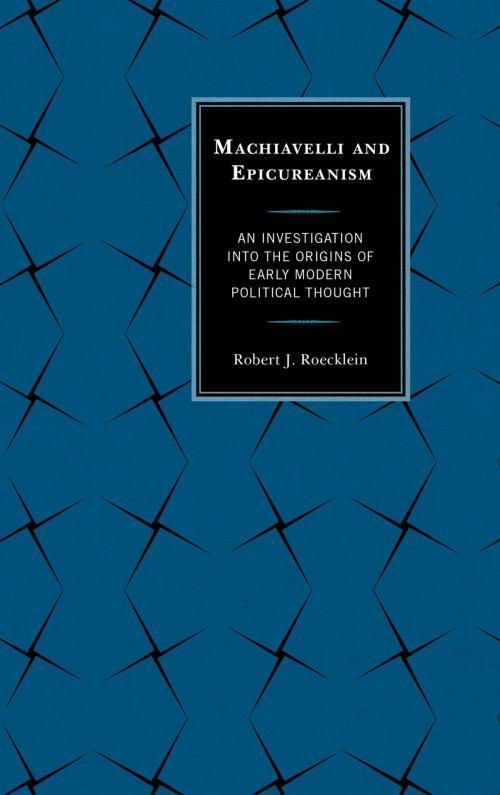Machiavelli and Epicureanism
An Investigation into the Origins of Early Modern Political Thought
Nonfiction, Religion & Spirituality, Philosophy, Epistemology, Ancient, Political| Author: | Robert J. Roecklein | ISBN: | 9780739177112 |
| Publisher: | Lexington Books | Publication: | October 5, 2012 |
| Imprint: | Lexington Books | Language: | English |
| Author: | Robert J. Roecklein |
| ISBN: | 9780739177112 |
| Publisher: | Lexington Books |
| Publication: | October 5, 2012 |
| Imprint: | Lexington Books |
| Language: | English |
This book investigates the influence of Epicurean physics on the argument developed in Machiavelli’s Discourses on Livy. Towards this end, the full philosophical history and origins of atomist philosophy are investigated during the first three chapters. Plato’s critique of the atomist philosophy, from his dialogue the Parmenides, is a part of that investigation. In fact, Plato provides a refutation of the atomist philosophy in the Parmenides. A significant amount of scholarship has been accomplished that demonstrates the currents of Lucretian atomism in Machiavelli’s Florence. Evidence is supplied as to Machiavelli’s exposure to the Lucretian text, and the book then proceeds to investigate the transformational arguments of the Discourses On Livy itself. Machiavelli’s Discourses are saturated with terminology that is borrowed from physics: ‘materia’ (Matter), ‘corpo’ (body), ‘forma’ (form), ‘accidente’ (accident). English translators have usually employed some theory as to which tradition of physics Machiavelli is relying upon, in order to conduct their translations. By borrowing the terminology of Lucretian physics, Machiavelli becomes able to conceive of the people in a political society as something less than human: as ‘matter’ or materia without form. In my analysis of Machiavelli’s deployment of the concepts from Lucretian physics, it is attempted to unveil the brutality that is inherent in Machiavelli’s new definitions of the elements of politics, and the general hostility of his political science to the Aristotelian concept of the human being as political animal. The classical physics of Aristotle, which Machiavelli has rejected for a model, indicates the forward looking momentum of natural beings. For Aristotle, nature intends human political society as the arena for human fulfillment. In Aristotelian physics, nature aims at an end in generation, i.e. at a culmination of the natural being in its proper condition of excellence. For human beings, this is justice, the quality of relationships that makes happiness possible. In Machiavelli, a new politicized physics is revealed. In Machiavelli’s model, the human beings of formed matter are repeatedly sent, through new institutions and methods of government, ‘back to their beginnings’, i.e. to a condition of isolation, destitution, injury, and pain. The last chapter of the book concludes with an examination of the particular institutions and methods that Machiavelli holds out to us for employment, if his new vision of a republic is to be realized.
This book investigates the influence of Epicurean physics on the argument developed in Machiavelli’s Discourses on Livy. Towards this end, the full philosophical history and origins of atomist philosophy are investigated during the first three chapters. Plato’s critique of the atomist philosophy, from his dialogue the Parmenides, is a part of that investigation. In fact, Plato provides a refutation of the atomist philosophy in the Parmenides. A significant amount of scholarship has been accomplished that demonstrates the currents of Lucretian atomism in Machiavelli’s Florence. Evidence is supplied as to Machiavelli’s exposure to the Lucretian text, and the book then proceeds to investigate the transformational arguments of the Discourses On Livy itself. Machiavelli’s Discourses are saturated with terminology that is borrowed from physics: ‘materia’ (Matter), ‘corpo’ (body), ‘forma’ (form), ‘accidente’ (accident). English translators have usually employed some theory as to which tradition of physics Machiavelli is relying upon, in order to conduct their translations. By borrowing the terminology of Lucretian physics, Machiavelli becomes able to conceive of the people in a political society as something less than human: as ‘matter’ or materia without form. In my analysis of Machiavelli’s deployment of the concepts from Lucretian physics, it is attempted to unveil the brutality that is inherent in Machiavelli’s new definitions of the elements of politics, and the general hostility of his political science to the Aristotelian concept of the human being as political animal. The classical physics of Aristotle, which Machiavelli has rejected for a model, indicates the forward looking momentum of natural beings. For Aristotle, nature intends human political society as the arena for human fulfillment. In Aristotelian physics, nature aims at an end in generation, i.e. at a culmination of the natural being in its proper condition of excellence. For human beings, this is justice, the quality of relationships that makes happiness possible. In Machiavelli, a new politicized physics is revealed. In Machiavelli’s model, the human beings of formed matter are repeatedly sent, through new institutions and methods of government, ‘back to their beginnings’, i.e. to a condition of isolation, destitution, injury, and pain. The last chapter of the book concludes with an examination of the particular institutions and methods that Machiavelli holds out to us for employment, if his new vision of a republic is to be realized.















